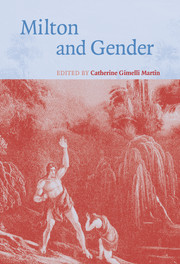Book contents
- Frontmatter
- Contents
- List of illustrations
- Notes on contributors
- Acknowledgments
- Abbreviations
- Introduction: Milton's gendered subjects
- PART I MASCULINITY, DIVORCE, AND MISOGYNY IN MILTON'S PROSE
- PART II THE GENDERED SUBJECTS OF MILTON'S MAJOR POEMS
- 4 The profession of virginity in A Maske Presented at Ludlow Castle
- 5 The genders of God and the redemption of the flesh in Paradise Lost
- 6 Transported touch: the fruit of marriage in Paradise Lost
- 7 The experience of defeat: Milton and some female contemporaries
- 8 Samson and surrogacy
- 9 “I was his nursling once”: nation, lactation, and the Hebraic in Samson Agonistes
- 10 “The Jewish Question” and “The Woman Question” in Samson Agonistes: gender, religion, and nation
- PART III GENDERED SUBJECTIVITY IN MILTON'S LITERARY HISTORY
- Index
8 - Samson and surrogacy
Published online by Cambridge University Press: 22 September 2009
- Frontmatter
- Contents
- List of illustrations
- Notes on contributors
- Acknowledgments
- Abbreviations
- Introduction: Milton's gendered subjects
- PART I MASCULINITY, DIVORCE, AND MISOGYNY IN MILTON'S PROSE
- PART II THE GENDERED SUBJECTS OF MILTON'S MAJOR POEMS
- 4 The profession of virginity in A Maske Presented at Ludlow Castle
- 5 The genders of God and the redemption of the flesh in Paradise Lost
- 6 Transported touch: the fruit of marriage in Paradise Lost
- 7 The experience of defeat: Milton and some female contemporaries
- 8 Samson and surrogacy
- 9 “I was his nursling once”: nation, lactation, and the Hebraic in Samson Agonistes
- 10 “The Jewish Question” and “The Woman Question” in Samson Agonistes: gender, religion, and nation
- PART III GENDERED SUBJECTIVITY IN MILTON'S LITERARY HISTORY
- Index
Summary
SurrogateL. surrogatus, pp. of surrogare to choose in place of another, substitute. A: to appoint as successor, deputy, or substitute for oneself B: substitute
For Milton's Samson, the most painful aspect of captivity is produced by the dilemma of surrogacy. To be for Samson is to subject himself to a will he cannot entirely know or understand. The urgently repeated question of the poem – for whom is Samson an instrument? – deflects attention away from the fact that Samson is always an instrument, whether for the Hebrews, the Philistines, or for God, his body used to fulfill purposes which are not his own. In his captivity Samson is continually reminded by the characters around him that his labors are being used by the Philistines against his own people. Even his rest from labor is not his own. More disturbingly, Samson's desires are construed as separate from him, divinely ordained. “Motions” that move within him suggest that while desire is experienced as bodily, it is in fact a propulsion that he can gauge but that he did not himself produce. What made him long for the bride at Timnah, and then for Dalila? As Samson explains to the Chorus, his first marriage was not the fulfillment of his own desire, but rather the beginning of his “divine labor”: “what I motion'd was of God; I knew / From intimate impulse, and therefore urg'd / the Marriage on” (SA 222–3).
- Type
- Chapter
- Information
- Milton and Gender , pp. 153 - 166Publisher: Cambridge University PressPrint publication year: 2005



